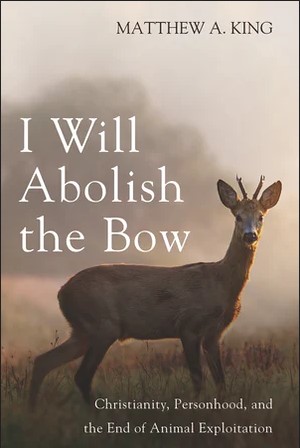Matthew King: I Will Abolish The Bow
 Matthew A. King, I Will Abolish The Bow: Christianity, Personhood, and the End of Animal Exploitation (Eugene, OR: Wipf and Stock, 2021), ix-131 pages, ISBN 9781666700275.
Matthew A. King, I Will Abolish The Bow: Christianity, Personhood, and the End of Animal Exploitation (Eugene, OR: Wipf and Stock, 2021), ix-131 pages, ISBN 9781666700275.
Matthew A. King is the cofounder and president of the Christian Animal Rights Association, an organization dedicated to ending animal cruelty and exploitation. King believes that Christianity’s historic support for eating meat and animal use stems from an incorrect understanding of the biblical testimony. The title of the book is taken from Hosea 2:18 which says,
“In that day I will also make a covenant for them
With the beasts of the field,
The birds of the sky
And the creeping things of the ground.
And I will abolish the bow, the sword and war from the land,
And will make them lie down in safety.” (NASB)
King employs the standard Christian virtues of sacrificial giving, love of neighbor and alleged vegan diet of the Garden of Eden to ground his animal-friendly ethic. Like other Christian animal rights activists, King contends that God’s original plan was for humans and animals to live in non-exploitative harmony where human rulership was characterized as servant, perhaps sacrificial, non-consumptive leadership over animals and that God’s future plan is to restore a world with animal-human harmony (Isa 11:6-9; 65:25 and Hosea 2:18 (p.xiii). One of King’s contributions to the Christian animal rights movement is his moral rubric called the New Earth Abolition (NEA) that organizes the principles of human-animal relations. The NEA consists of three pillars namely, 1. Treat animals the way you would like to be treated (Matt 7:12; 22:39; Mk 12:31; Lk 6:31; 10:27), 2. Humans should serve animals not exploit them (Mk 9:35; Philp 2:3-4) and 3. Humans should foster harmony with animals and between animals (Gen 1:20-30; p.23).
King, however, does not believe the traditional arguments (e.g., respect for weaker/lesser creatures) for animal rights go far enough to press and justify the proper treatment of animals. He believes that animals must be recognized as “persons” and thus of equal moral status as humans. To support this radical contention (at least from a “Christian” perspective), King appeals to Scripture’s use of nephesh hayah (living soul) and scientific evidence regarding animal sentience.
The behavioral implications of King’s philosophy for Christian ethics is as far reaching as it is shocking. As expected, he opposes consumption of animal products (e.g., meat, eggs, milk, etc.). But surprisingly, even honey is banned from the list of allowed foods (p. 24). In like manner, King believes that insects must be left alone because they have individual personalities and a fluid that is analogous to blood (pp. 95-6). He breaks with some animal rights activists by accepting the legitimacy of dogs and cats as domestic animals. However, owners must feed their dogs a vegan diet so as not to run afoul of principle 3 of the NEA (p.34). In a concession to reality, he acknowledges that cats must still be fed meat because they are “obligate carnivores”. He hopes someday laboratory meat will be available to resolve even this ethical concession.
How we treat animals is an important topic that should be based in a proper understanding of scientific inquiry and biblical interpretation.
I agree with King’s belief that animal treatment is an important topic that should be based in a proper understanding of scientific inquiry and biblical interpretation. Regrettably, King’s reach for a resolution far outdistanced his grasp. His work suffers from several key weaknesses, each of which is terminal in its effect.
First, King fails to read broadly enough to fully understand and appreciate the monumental difficulty of justifying an animal rights position biblically and scientifically. For example, if he had read my book, Dominion over Wildlife? An Environmental-Theology of Human-Wildlife Relations (Wipf and Stock, 2012), he would have known that Adam and Eve could have killed animals while still being vegans (cf. kabash, “subdue” Gen 1:28). In similar fashion, King seems unaware of how human-wildlife conflicts constitute a significant threat to human health, safety and food security both in ancient times and today.
Second, King’s interpretation of Scripture at times is so forced that one wonders whether his reading would be recognized by the original author. For example, on pages 72-73, King argues that John 10:11 (I am the good shepherd) is not just a metaphor of Christ’s care for humans but a literal statement of Christ’s service to animals. Another example of strained exegesis can be seen on p. 77 where he discusses the Gerasene demoniac and the drowning of pigs. It never seems to occur to King that Christ can still be charged with animal cruelty for allowing demons to possess innocent and sentient animals (cf. p. 49). King’s inability to accept the text at face value as shown in his treatment of Isaiah 25:6 (pp. 81-82) causes one to wonder what wording the Bible would have had to use to convince King that eating animals was acceptable to God.
When does advocating for animal rights become a distraction from advancing the Kingdom of God?
One can only hope that King and his supporters will eventually take the time to read more deeply and broadly. King should not have written a book until he truly understood the arguments and claims of the traditional Christian view on animals. To understand before one criticizes exemplifies the Golden Rule, which unfortunately he does more for animals than those who believe in the traditional view. Christians interested in reading an animal rights perspective should look elsewhere as this book lacks the research and argument worthy of one’s time.
Reviewed by Stephen M. Vantassel
Publisher’s page: https://wipfandstock.com/9781666700275/i-will-abolish-the-bow/


